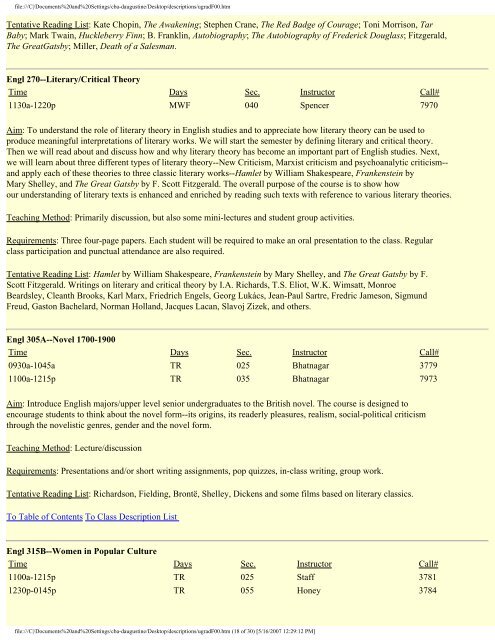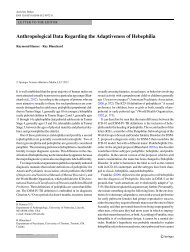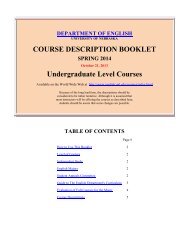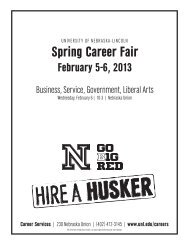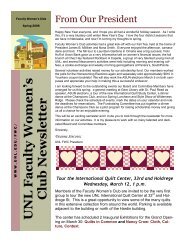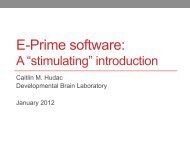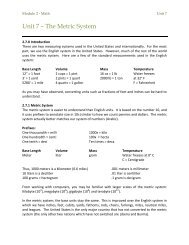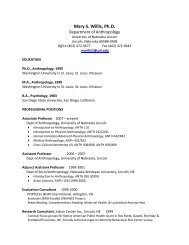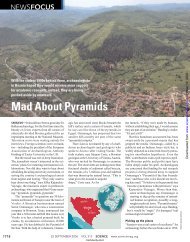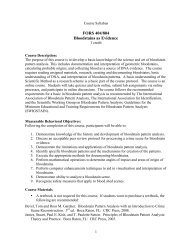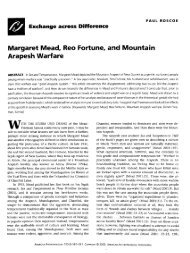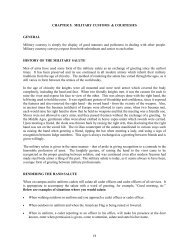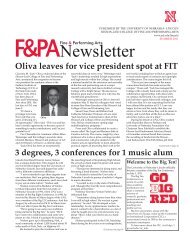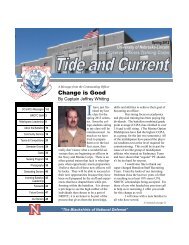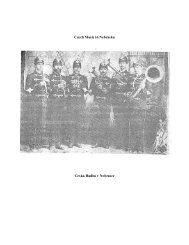Fall 2000 - The University of Nebraska–Lincoln
Fall 2000 - The University of Nebraska–Lincoln
Fall 2000 - The University of Nebraska–Lincoln
You also want an ePaper? Increase the reach of your titles
YUMPU automatically turns print PDFs into web optimized ePapers that Google loves.
file:///C|/Documents%20and%20Settings/cba-daugustine/Desktop/descriptions/ugradF00.htm<br />
Tentative Reading List: Kate Chopin, <strong>The</strong> Awakening; Stephen Crane, <strong>The</strong> Red Badge <strong>of</strong> Courage; Toni Morrison, Tar<br />
Baby; Mark Twain, Huckleberry Finn; B. Franklin, Autobiography; <strong>The</strong> Autobiography <strong>of</strong> Frederick Douglass; Fitzgerald,<br />
<strong>The</strong> GreatGatsby; Miller, Death <strong>of</strong> a Salesman.<br />
Engl 270--Literary/Critical <strong>The</strong>ory<br />
Time Days Sec. Instructor Call#<br />
1130a-1220p MWF 040 Spencer 7970<br />
Aim: To understand the role <strong>of</strong> literary theory in English studies and to appreciate how literary theory can be used to<br />
produce meaningful interpretations <strong>of</strong> literary works. We will start the semester by defining literary and critical theory.<br />
<strong>The</strong>n we will read about and discuss how and why literary theory has become an important part <strong>of</strong> English studies. Next,<br />
we will learn about three different types <strong>of</strong> literary theory--New Criticism, Marxist criticism and psychoanalytic criticism--<br />
and apply each <strong>of</strong> these theories to three classic literary works--Hamlet by William Shakespeare, Frankenstein by<br />
Mary Shelley, and <strong>The</strong> Great Gatsby by F. Scott Fitzgerald. <strong>The</strong> overall purpose <strong>of</strong> the course is to show how<br />
our understanding <strong>of</strong> literary texts is enhanced and enriched by reading such texts with reference to various literary theories.<br />
Teaching Method: Primarily discussion, but also some mini-lectures and student group activities.<br />
Requirements: Three four-page papers. Each student will be required to make an oral presentation to the class. Regular<br />
class participation and punctual attendance are also required.<br />
Tentative Reading List: Hamlet by William Shakespeare, Frankenstein by Mary Shelley, and <strong>The</strong> Great Gatsby by F.<br />
Scott Fitzgerald. Writings on literary and critical theory by I.A. Richards, T.S. Eliot, W.K. Wimsatt, Monroe<br />
Beardsley, Cleanth Brooks, Karl Marx, Friedrich Engels, Georg Lukács, Jean-Paul Sartre, Fredric Jameson, Sigmund<br />
Freud, Gaston Bachelard, Norman Holland, Jacques Lacan, Slavoj Zizek, and others.<br />
Engl 305A--Novel 1700-1900<br />
Time Days Sec. Instructor Call#<br />
0930a-1045a TR 025 Bhatnagar 3779<br />
1100a-1215p TR 035 Bhatnagar 7973<br />
Aim: Introduce English majors/upper level senior undergraduates to the British novel. <strong>The</strong> course is designed to<br />
encourage students to think about the novel form--its origins, its readerly pleasures, realism, social-political criticism<br />
through the novelistic genres, gender and the novel form.<br />
Teaching Method: Lecture/discussion<br />
Requirements: Presentations and/or short writing assignments, pop quizzes, in-class writing, group work.<br />
Tentative Reading List: Richardson, Fielding, Brontë, Shelley, Dickens and some films based on literary classics.<br />
To Table <strong>of</strong> Contents To Class Description List<br />
Engl 315B--Women in Popular Culture<br />
Time Days Sec. Instructor Call#<br />
1100a-1215p TR 025 Staff 3781<br />
1230p-0145p TR 055 Honey 3784<br />
file:///C|/Documents%20and%20Settings/cba-daugustine/Desktop/descriptions/ugradF00.htm (18 <strong>of</strong> 30) [5/16/2007 12:29:12 PM]


